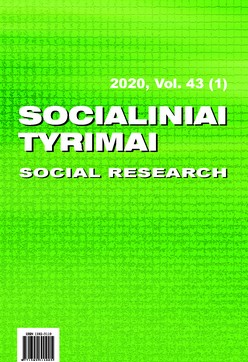Viešosios bibliotekos veikla socialinę atskirtį patiriančių visuomenės grupių skaitmeninės įtraukties didinimo srityje
Libraries in Increasing the Digital Inclusion of Socially Excluded Groups in Society
Author(s): Kristina Kulikauskienė, Diana ŠaparnienėSubject(s): Library operations and management, Social Informatics, ICT Information and Communications Technologies
Published by: Vilniaus Universiteto Leidykla
Keywords: digital inclusion; the role of public libraries in increasing digital inclusion;
Summary/Abstract: In today’s world, information and communication technologies (ICT) and the ability to use their potential effectively, provide access to the latest information, digital services, communication, prompt inclusion in the labour market, participation in lifelong learning, and are an integral part of the successful functioning of society (Ekbia, 2016; Fabre and Popova, 2017). At the same time, the growing importance of ICT creates new challenges in ensuring equal opportunities for all, without exception, to have access to technological equipment, the Internet, the development of digital competences and digital services, and to enable them to use ICT effectively. The need to increase digital inclusion is particularly important in this area. Digital inclusion is associated with enabling socially excluded groups in society to use digital technologies effectively: for effective communication, participation in various activities, involvement in society and community (Real et al. 2014; Newman et al. 2017). The goals of digital inclusion are inseparable from the goals of social inclusion (Farooq et al., 2015; Beyene, 2018), in which the inclusion of all persons without exception, especially those belonging to socially excluded groups, in society and community is important. Caruso (2014), Bertot (2016), Borg and Smith (2018), Beyene (2018), Strover et al. (2020) note that digital inclusion comprises three key principles: access to the latest technologies, ICT adoption and application. The principle of application is the most important principle. It comprises the effective use of ICT, digital information and digital competences for learning, employment, self-education, civic participation, health strengthening and other purposes. Public libraries are very important organizations in increasing digital inclusion. In order to increase digital inclusion, public libraries should carry out activities aimed at providing access to ICT and the Internet, improving the digital competences and offering digital services. In this area, it is particularly important for public libraries to exploit the potential of their wide network of institutions, the variety of free services and possibilities to cooperate with other organizations. These aspects exclude public libraries from other institutions, enabling them to involve more people in digital inclusion activities and reach the most vulnerable groups of society that often experience social exclusion (Yılmaz and Cevher, 2015; Casselden, Pickard and McLeod, 2015; Appleton et al. 2018; Wyatt, Mcquire and Butt, 2018). The need to foster digital inclusion highlights the necessity to assess the activities of public libraries in increasing digital inclusion empirically. The aim of this article is to investigate the activities of public libraries in increasing the digital inclusion and to identify possible directions for the improvement of digital inclusion. The case of Šiauliai region was chosen for the empirical research. The methods of scientific literature content analysis, structured E- mail interview, systematization and generalization of collected data and secondary data analysis were employed in this research. The empirical research has shown that the activities of Šiauliai region libraries in the field of increasing digital inclusion include the main ones discussed in the scientific literature (Caruso, 2014; Nemer, 2015; Bertot, 2016; Luterek 2017; Beyene, 2018; Gregg and McKendry, 2018; Strover et al. 2020); ensuring free access to ICT and the Internet, developing digital competences and providing digital services. Free access to ICT and the Internet offered by public libraries is important for people with disabilities and seniors, providing opportunities to take care of health, communicate with relatives and save money. Digital literacy training in libraries, individual consultations and some digital services (e.g. e-books, virtual events) are relevant to these target groups. However, the involvement of people with disabilities and seniors in these activities is insufficient, especially in the area of access to digital services.
Journal: Socialiniai tyrimai
- Issue Year: 43/2020
- Issue No: 1
- Page Range: 32-44
- Page Count: 13
- Language: Lithuanian

